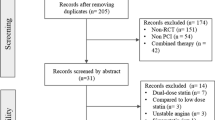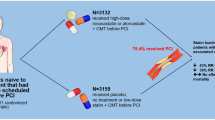Abstract
Purpose
The effectiveness of statins in improving clinical outcomes among patients with heart failure (HF) undergoing percutaneous coronary intervention (PCI) is unclear. We examined the association between use of statins and clinical outcomes in patients with HF included in the Melbourne Interventional Group registry.
Methods
Patients were followed from 30 days to 1 year post-PCI for a primary composite outcome of all-cause mortality and hospitalisation for cardiovascular (CV) causes. Secondary outcomes included major adverse cardiac events (MACE, a composite of all-cause mortality, myocardial infarction and target vessel revascularisation) and hospitalisation for CV causes. Outcomes were compared between statin-treated and non-statin-treated patients (at 30 days post-PCI) using propensity scores to balance for risk factors.
Results
Among 991 patients included in the inverse probability-weighted Cox model, statin use had no significant effect on the primary composite outcome [adjusted hazard ratio (aHR), 1.03; 95% confidence interval (CI), 0.68 to 1.56; p = 0.89], nor MACE (aHR, 0.99; 95% CI, 0.54 to 1.84; p = 0.99) or hospitalisation for CV causes (HR, 1.13; 95% CI, 0.74 to 1.72; p = 0.57).
Conclusions
Our results suggest that statin therapy may confer no significant benefits in patients with HF undergoing PCI. However, prospective randomised controlled trials are needed to provide more definitive answers.

Similar content being viewed by others
References
Cholesterol Treatment Trialists’ (CTT) Collaboration. Efficacy and safety of more intensive lowering of LDL cholesterol: a meta-analysis of data from 170 000 participants in 26 randomised trials. Lancet. 2010;376(9753):1670–81.
Tousoulis D, Charakida M, Stefanadi E, Siasos G, Latsios G, Stefanadis C. Statins in heart failure. Beyond the lipid lowering effect. Int J Cardiol. 2007;115(2):144–50.
Raina A, Pickering T, Shimbo D. Statin use in heart failure: a cause for concern? Am Heart J. 2006;152(1):39–49.
Kjekshus J, Apetrei E, Barrios V, Böhm M, Cleland JGF, Cornel JH, et al. Rosuvastatin in older patients with systolic heart failure. N Engl J Med. 2007;357(22):2248–61.
GISSI-HF investigators. Effect of rosuvastatin in patients with chronic heart failure (the GISSI-HF trial): a randomised, double-blind, placebo-controlled trial. Lancet. 2008;372:1231–9.
Feinstein MJ, Jhund P, Kang J, Ning H, Maggioni A, Wikstrand J, et al. Do statins reduce the risk of myocardial infarction in patients with heart failure? A pooled individual-level reanalysis of CORONA and GISSI-HF. Eur J Heart Fail. 2015;17(4):434–41.
Hong YJ, Jeong MH, Hyun DW, Hur SH, Kim KB, Kim W, et al. Prognostic significance of simvastatin therapy in patients with ischemic heart failure who underwent percutaneous coronary intervention for acute myocardial infarction. Am J Cardiol. 2005;95(5):619–22.
Ajani AE, Szto G, Duffy SJ, Eccleston D, Clark DJ, Lefkovits J, et al. The foundation and launch of the Melbourne interventional group: a collaborative interventional cardiology project. Heart lung and. Circulation. 2006;15:44–7.
Andrianopoulos N, Dinh D, Duffy SJ, Clark DJ, Brennan AL, Chan W, et al. Quality control activities associated with registries in interventional cardiology and surgery. Heart Lung Circ. 2011;20(3):180–6.
Lee KJ, Simpson JA. Introduction to multiple imputation for dealing with missing data. Respirology. 2014;19(2):162–7.
Schafer JL, Olsen MK. Multiple imputation for multivariate missing-data problems: a data analyst’s perspective. Multivar Behav Res. 33(4):545–71.
Graham JW, Olchowski AE, Gilreath TD. How many imputations are really needed? Some practical clarifications of multiple imputation theory. Prev Sci. 2007;8:206–13.
Austin PC. The use of propensity score methods with survival or time-to-event outcomes: reporting measures of effect similar to those used in randomized experiments. Stat Med. 2014;33(7):1242–58.
Haukoos JS, Lewis RJ. The propensity score. JAMA. 2015;314(15):1637–8.
Seaman SR, White IR, Copas AJ, Li L. Combining multiple imputation and inverse-probability weighting. Biometrics. 2012;68(1):129–37.
Rubin DB. Multiple imputation for non response in surveys. New York: Wiley; 1987.
Stone NJ, Robinson J, Lichtenstein AH, Merz CNB, Blum CB, Eckel RH et al. 2013 ACC/AHA guideline on the treatment of blood cholesterol to reduce atherosclerotic cardiovascular risk in adults: a report of the American College of Cardiology/American Heart Association Task Force on Practice Guidelines Circulation. 2013;00:000–.
Krum H, McMurray JJV. Statins and chronic heart failure: do we need a large-scale outcome trial? J Am Coll Cardiol. 2002;39(10):1567–73.
Ashton E, Windebank E, Skiba M, Reid C, Schneider H, Rosenfeldt F, et al. Why did high-dose rosuvastatin not improve cardiac remodeling in chronic heart failure? Mechanistic insights from the UNIVERSE study. Int J Cardiol. 2011;146(3):404–7.
Kalantar-Zadeh K, Block G, Horwich TB, Fonarow GC. Reverse epidemiology of conventional cardiovascular risk factors in patients with chronic heart failure. J Am Coll Cardiol. 2004;43(8):1439–44.
Greene SJ, Vaduganathan M, Lupi L, Ambrosy AP, Mentz RJ, Konstam MA, et al. Prognostic significance of serum total cholesterol and triglyceride levels in patients hospitalized for heart failure with reduced ejection fraction (from the EVEREST trial). Am J Cardiol. 2013;111(4):574–81.
Catapano AL, Graham I, De Backer G, Wiklund O, Chapman MJ, Drexel H, et al. 2016 ESC/EAS guidelines for the Management of Dyslipidaemias: the task force for the management of Dyslipidaemias of the European Society of Cardiology (ESC) and European Atherosclerosis Society (EAS) developed with the special contribution of the European Association for Cardiovascular Prevention & Rehabilitation (EACPR). Eur Heart J. 2016;37(39):2999–3058.
Dobre D, Rossignol P, Murin J, Parkhomenko A, Lamiral Z, Krum H, et al. Statin therapy and clinical outcomes in myocardial infarction patients complicated by acute heart failure: insights from the EPHESUS trial. Eur J Heart Fail. 2013;15(2):221–7.
Jeong HC, Ahn Y, Park K-H, Sim DS, Hong YJ, Kim JH, et al. Effect of statin treatment in patients with acute myocardial infarction and left ventricular systolic dysfunction according to the level of high-sensitivity C-reactive protein. Int Heart J. 2014;55(2):106–12.
Woo JS, Hwang SJ, Kim HS, Kim JB, Kim W-S, Kim KS, et al. Effects of statin therapy on clinical outcomes of survivors of acute myocardial infarction with severe systolic heart failure. PLoS One. 2015;10(12):e0144602.
Acknowledgements
KLC receives a PhD scholarship from the Ministry of Education, Malaysia. This work was supported by a NHMRC Program Grant (1092642) awarded to CMR. CMR is supported by a Research Fellowship (1045862) from the National Health and Medical Research Council of Australia (NHMRC). IH is supported by a National Health and Medical Research Council Early Career Fellowship (1113314). SJD’s work is supported by NHMRC grants.
Funding
The Melbourne Interventional Group acknowledges funding from Abbott, Astra-Zeneca, Biotronik, Boston Scientific, Bristol-Myers Squibb, Cordis Johnson & Johnson, CSL, Medtronic, MSD, Pfizer, Sanofi-Aventis, Servier, Schering-Plough and The Medicines Company. The funding bodies had no role in the design and conduct of the study, the collection, management, analysis and interpretation of the data, or the preparation, review or approval of the manuscript.
Author information
Authors and Affiliations
Consortia
Corresponding author
Ethics declarations
Conflict of Interest
The authors declare that they have no conflict of interest.
Ethical Approval
This study was approved by the Alfred Hospital Ethics Committee (107/16) and Monash University Human Research Ethics Committee (CF16/841 – 2016000420).
Informed Consent
The registry employed an ‘opt-out’ informed consent which requires patient to sign a declaration only if they refuse to contribute their relevant information, or do not want to be followed up beyond the coronary intervention.
Rights and permissions
About this article
Cite this article
Chin, K.L., Wolfe, R., Reid, C.M. et al. Does Statin Benefits Patients with Heart Failure Undergoing Percutaneous Coronary Intervention? Findings from the Melbourne Interventional Group Registry. Cardiovasc Drugs Ther 32, 57–64 (2018). https://doi.org/10.1007/s10557-018-6769-y
Published:
Issue Date:
DOI: https://doi.org/10.1007/s10557-018-6769-y




